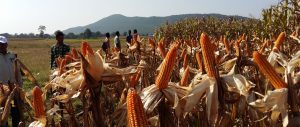CSISA Launches Collaboration with Government of Odisha

ODISHA, India (CSISA) – In its latest efforts to facilitate the adoption of sustainable intensification technologies in eastern India, the Cereal Systems Initiative for South Asia (CSISA) has launched a collaboration with the Department of Agriculture and Farmers’ Empowerment (DAFE) in the Indian state of Odisha.
A letter of intent signed by both parties outlines five themes: improving maize production in the Odisha plateau, growing the service economy for agricultural mechanization, rice fallows intensification, data-driven monitoring and evaluation, and advancing the science and impact of precision nutrient management through India’s soil health card scheme. The collaboration constitutes a major push to accelerate agriculture productivity growth in the state.
In collaboration with the DAFE, CSISA piloted hybrid maize cultivation and proper nutrient and weed management practices in the north-central plateau of Odisha. Farmers realized a grain yield of 4.8 tons per hectare; almost double that of traditional maize yields.
For maize, post-harvest management is very challenging because it coincides with monsoon season when hot and wet conditions persist. Farmers need management innovations to maintain good grain quality, particularly when monsoon-harvested maize is destined for dry grain markets. CSISA and DAFE are designing post-harvest and marketing interventions to help farmers’ maize harvests reach markets.
The key drivers of agricultural machinery-based entrepreneurship must be understood to grow a service economy. CSISA and DAFE are conducting a study to clarify the motivating factors behind farmers becoming service providers. Data collection for the study will occur in October–November 2017 and the results of the study will guide key policy actions to modify the existing subsidy structures, which will provide a thrust to the service economy by effectively utilizing state resources.
Some complex factors cause farmers to leave land fallow, or unused, after the rice season in Odisha, and ad-hoc investments will not yield effective or sustainable solutions. The decision process behind leaving land fallow goes beyond biophysical and technical issues. CSISA found that complex constraining factors – social, economic and political – and trade-offs that farmers face greatly affect the decision.
To understand some of these complexities, CSISA conducted participatory diagnostics of three things, potential interventions, the sequencing of those interventions, and the coordination of those interventions, which could stimulate intensified cropping in the rice fallows of coastal Odisha. CSISA, with experts from stakeholder organizations, conducted workshops with farmers at the village and district levels.
These participatory diagnostics of decision-making around the cultivation of fallow land highlighted the importance of considering unconventional issues, such as poor synchronization of markets with new-crop investment and credit repayment timing. A state-level working committee has been formed to develop seasonal work plans for this theme, as well as to monitor activities, such as how to generate evidence on fallow investment preferences and the design and implementation of experiments.
In 2016, CSISA, the Government of Odisha and private sector actors cultivated approximately 4,000 hectares of fallow land with hybrid maize, an initiative that has benefitted smallholder tribal farmers primarily. Seeing the success, DAFE urged CSISA to implement similar interventions in other areas of the state.
In the spring of 2017, CSISA began work in the west-central plateau of Odisha. In this area, CSISA facilitated the availability of hybrid seeds, high-quality planting equipment and extension workers trained on best management practices for maize. These interventions were the first of their kind in the area and resulted in the cultivation of 600 additional hectares in the 2017 cropping season. CSISA and DAFE are jointly planning further expansion to additional districts, especially areas where mechanization is uncommon.
CSISA considers precision nutrient management critical for sustainable intensification and, in collaboration with various government agencies, has engaged a team to assess the Indian government’s Soil Health Card (SHC) system.
CSISA’s experience in facilitating the uptake of improved agricultural technologies, as well as the integration of new information, indicates that the distribution of soil health cards alone will not be sufficient for generating behavior change at the farm level. To understand farmers’ perspectives on SHCs, CSISA conducted user tests in several districts of Bihar and Odisha to see which information farmers understood and adopted from the SHC. Researchers found that although the cards contain significant essential information, farmers have a difficult time understanding it. Therefore, CSISA and government partners are collaborating to simplify the SHC and make it more user-friendly and farmer-accessible.
CSISA is supporting the state’s learning & evaluation (ML&E) systems to ensure that feedback from the field is used to help set the next year’s priorities. The collaboration will focus on the training of extension staff on effective tools and techniques for digital data collection, as well as data analysis. CSISA conducted training for DAFE staff on an open source software called open data kit (ODK), in May 2017. Follow-up trainings will provide capacity building on data analysis tools and techniques.
Using ODK, the trained staff will now capture survey data according to a standardized questionnaire agreed to by the group. Since data will be collected in ODK, it will be available through an online database to DAFE researchers. CSISA will provide the initial support to DAFE for the analysis of the data and interpretation of the results. Results will help policymakers fine-tune agricultural programming and inform their agricultural investments. Analytical and design work is underway, and results are expected to emerge by mid-October 2017.
The Cereal Systems Initiative for South Asia is led by the International Maize and Wheat Improvement Center and implemented jointly with the International Food Policy Research Institute and the International Rice Research Institute.
